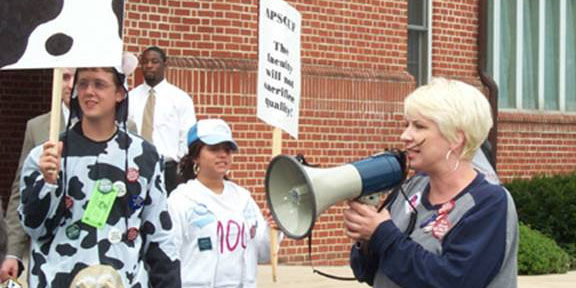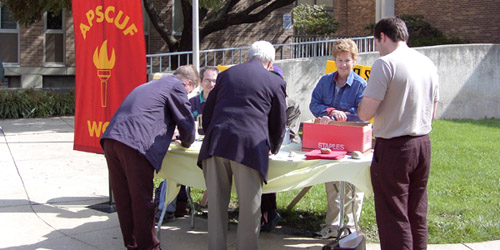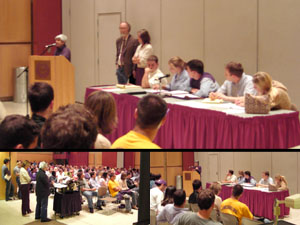

APSCUF MEMBERS RATIFY AGREEMENT WITH STATE SYSTEMNEWS RELEASE HARRISBURG (Wednesday, April 7, 2004)Faculty members at Pennsylvania's 14 state-owned universities have voted to accept a new four-year contract agreement with the State System of Higher Education. A total of 3,324 APSCUF members, or 69% of those eligible, took part in the election. The final tally shows 2,395 (72%) voted for ratification, while 929 (28%) opposed the pact. Campus voting was conducted at various hours on the campuses from March 31-April 5. "This vote was a difficult one for faculty," State APSCUF President William E. Fulmer said. "Those voting against ratification named as the primary reasons the loss of an incremental step for junior faculty this year and management's cavalier disregard for equity for 128 newly promoted junior faculty members." Fulmer cited the faculty's role in quality and academic issues as a key reason for the positive vote. "The majority supported ratification because the proposed contract does preserve our influence on quality issues and insures that the academic interests of faculty members and students are protected," Fulmer related. "Our faculty members recognize that other avenues, e.g. the Governor's Committee on Class Sizes, may be pursued to achieve justice within our universities. I believe that this was the best bargain we could achieve at this time, and we are grateful to Governor Rendell for helping to bring it about." The State System of Higher Education Board of Governors will consider the tentative agreement on Thursday. If ratified by the Board, the contract will be retroactive to July 1, 2003 and extend to June 30, 2007. WCU-APSCUF FACULTY WILL VOTE ON RATIFICATION OF THE TENTATIVE CONTRACT AGREEMENT ON THURSDAY 4/1 AND FRIDAY 4/2(with provision for three alternative voting times, see below) YES, is a vote to ratify the tentative contract agreement reached between APSCUF and SSHE through the efforts made by the Governor.s office. No, is a vote against the ratification of the tentative contract agreement and a move to strike. WHEN and WHERE TO VOTE: 1. 9:00 to 3:00 Thursday and Friday
April 1st and 2nd
2. Thursday, April 1st voting moves to the
ALL Faculty Meeting 3. If you are unable to vote on 4/1 or 4/2 9:00 to 3:00 Wednesday March 31 you can vote in the APSCUF office 811 Roslyn Avenue 4. If you have a special difficulty and are unable to vote at any of the times listed above, we will accept votes in the APSCUF office. APSCUF office - 811 Roslyn Avenue - 610-436-1064 On Monday April 5 until 12:00 noon. It is critical that no APSCUF faculty member consider his/her vote discretionary. In this close ratification vote, ALL votes count. WCU APSCUF recommends ratification State APSCUF Executive Committee recommends ratification APSCUF State Delegate Assembly recommends ratification APSCUF AGREES TO TENTATIVE CONTRACT SETTLEMENT; CLASS SIZE CONTROLS WILL BE PURSUEDFebruary 6-8, 2004Copied from www.apscuf.comHARRISBURG--The organization that represents the 5,500 faculty members at Pennsylvania.s 14 state-owned universities today announced it has reached a tentative settlement with the State System of Higher Education on a new four-year contract. APSCUF and the State System had been negotiating for a new agreement since August, 2002. The previous contract expired on June 30, 2003. "At this stage, our negotiations team has proposed a settlement that includes acceptance of a salary package and health care provisions that parallel those recently accepted by AFSCME and the State," State APSCUF President William E. Fulmer said. It is a "bare bones" settlement which does include some language to protect the integrity of our programs, and which apparently does have the acceptance of the State System. Fulmer noted that the tentative settlement was made possible when Governor Ed Rendell asked his labor representative, Ken Jarin, to facilitate a deal between the two parties. Prior to Rendell.s efforts, talks had stalled back in December. "APSCUF thanks Governor Rendell for his intervention, without which the likelihood of a strike in August would have approached a certainty," Fulmer noted. The APSCUF bargaining team pledged to provide the full association membership with a realistic presentation of the tentative pact. "We will give a fair and faithful presentation of this agreement to faculty with a recommendation that this is the best agreement we are able to reach in the present circumstances," acting team chair William Chabala said. Fulmer noted that the uncertainty surrounding the negotiations had raised tension levels for both students and faculty to "unhealthy levels." "Seniors in their final semester have worried that they would not graduate on time. We, the faculty, are committed to our students and want them to know right now that the spring semester will proceed on schedule and will finish on time," Fulmer related. CLASS SIZE CONTROLS CRITICALQuality issues were the main focus of the negotiations for the faculty team, and Fulmer indicated that Governor Rendell shares APSCUF's concerns about growing class sizes at State System schools. "We especially appreciate Governor Rendell's willingness to help us seek class size controls through other venues," Fulmer noted. "This is an important academic quality issue for both faculty members and students." THE STEPS IN THE APPROVAL PROCESS"Our team will pass its statement to our Executive Council at its next regular meeting on Feb. 19, with the recommendation that the agreement be voted on by the full membership," Fulmer revealed. "If approved by the Executive Council, the recommendation will be delivered to our leadership Assembly, which meets on Feb. 20-21 in Altoona. If the Assembly so directs, the full membership will vote on the settlement shortly after that time." "If the APSCUF membership approves the settlement, the State System.s Board of Governors will likewise vote on it. So, there are several steps to the process yet ahead." ALL FACULTY MEETING SCHEDULED JAN. 27 at 3:30PMJanuary 19, 2004The meeting will be held in Main Hall Auditorium. All faculty should attend this meeting. A report on the recent meeting of Chapter Presidents and critical information on the negotiations will be provided.APSCUF REPRESENTATIVES MEET IN HARRISBURGJanuary 19, 2004HARRISBURG - Conducting a thorough assessment of the APSCUF/State System of Higher Education contract talks, local APSCUF chapter presidents joined with members of the APSCUF Negotiations Team for a three-hour meeting on Friday in Harrisburg. A wide variety of alternative courses of action was discussed by the group. APSCUF leadership will hold a press conference in early February to announce the organization's decision. Kevin P. Kodish Director of Communications APSCUF We're Movin' OutJanuary 16, 2004The West Chester Chapter of APSCUF will officially move off-campus on Wednesday, January 21. Please join your colleagues at the Montemuro house Wednesday afternoon starting at 1:30PM to move supplies and equipment. Students, staff, alumni, and even local administration are welcome to show their support by lending a hand or just hanging out as APSCUF says farewell to campus. Though we are forced to relocate the office off campus in preparation for a job action, we--West Chester APSCUF--will continue to make our presence known on campus. Faculty will be out on campus distributing information and this website will continue to be a place for getting information. State System Management Head Counts and Salaries: Time for a Reality Check!January 16, 2004This article was copied from WWW.APSCUF.COMWhile Negotiations have stagnated, and State System spokespersons still tout the mysteriously appearing/disappearing $40 million deficit (it had disappeared by the October Board of Governors meeting, according to the Chancellor.s report, but has reappeared in recent news releases issued by the State System communication office.) as the reason the SSHE cannot afford APSCUF's modest proposals. However, management salary increases paint a different picture. Check out our main website at APSCUF.com. Click on Contract Negotiations and Bulletin number 39 for a complete chart of management salary increases in recent years. What does a freeze in Management personnel mean?! Management in the System GREW by 15 between spring 2003 and fall 2003, at a total increased salary cost of $727,313. [Ed. Note: $1.1 million of this increase was at the Chancellor's office so that on average, management at local campuses, including West Chester, took a modest loss while the Chancellor's office ballooned.] When you divide that increase over the total number of managers in the system (1384) that equals $525+ per head. That increase ($727,313) would also pay for the salaries of almost 15 assistant professors for the academic year at Step 3. What benefits the students (and the System) more? 15 managers or 15 faculty? FOR FURTHER INFORMATION CONTACT: Kevin P. Kodish, Director of Communications, 800-932-0587, ext. 6, FAX 717-236-1883, email: kkodish@apscuf.com Happy New Year!January 5, 2004Well, we may hope for a Happy New Year, but the news out of Harrisburg is not happy at all. After an all too brief holiday vacation, APSCUF is preparing once again for a job action. Rather than use the time of good-will that generally surrounds the holidays as an opportunity to reach agreement, the state-system has continued its campaign of nastiness and delays. Below are excerpts from a report on the Dec. 18/19 negotiation sessions: APSCUF negotiators presented their health care proposal; [SSHE chief negotiator] Becker responded that they must think he is an idiot for them to submit the proposal--and the talks went downhill from there. It became clear that SSHE negotiators had not taken the time to look at the APSCUF proposal, had no grasp of the details related to health care, and no interest in learning them. Once health care was taken off the table, SSHE introduced its own new proposition that Dept. chairs conduct all classroom observations of temporary faculty. As a point of information SSHE negotiators then shared that on January 8th the BOG will vote to charge students a fee for all credits over 16, so as to discourage course shopping. All to be completed while students are out of break. And that was it. They then broke into separate groups and not much else happened. (more information) Bottom line, SSHE refused to discuss or offer suggestions on APSCUF proposals, negotiations appear to have broken down, and the two sides are farther apart now than they were a month ago. To add insult to injury Becker left early on Thursday for a dentist appointment, and early on Friday to pick up someone at the airport. No one offered any dates to renew talks. Chapter presidents are to meet in Harrisburg at 1pm on Jan. 16th to discuss what to do next. Local APSCUF chapters have been instructed to move offices off campus on January 12th, but this time also told to keep "a presence" on campus. Chancellor's Office Trying to Sneak a Tuition Increase in During BreakJan. 5, 2003--copied from IUP APSCUF websiteIn other news, at the State Meet & Discuss, the Chancellor's office indicated that they were going to redefine what constitutes a full load for undergraduate students, a sneaking way of imposing a huge tuition increase. Read more about this under-handed effort by the Chancellor's office to impose a "stealth" increase while students and faculty are away, and what you can do about it. Chancellor Sends Her View on the Negotiations to All SSHE StudentsJanuary 5, 2004Disguised as informational emails, the Chancellor sent all 104,000 SSHE students emails with the subject line "Faculty Strike: What You Need to Know" and "Faculty Salaries: What Students Need to Know." Much of what was sent in the first email was a skewed view of what might happen in the event of a faculty strike. Rather than go through a point-by-point analysis, APSCUF wants to make it clear that a strike has the potential to do severe damage to the institution, the faculty, and the students. Several faculty have been through strikes in the past and we know the damage that can be caused. That's why APSCUF has tried so hard to keep negotiation on track despite juvenile behavior from the SSHE chief negotiator and the chancellor. The second email is at best propaganda; at worst outright lies. APSCUF disagrees with several of the statistics and positions put forth in the chancellor's email. They are simple wrong. Again, rather than a long point-by-point analysis, APSCUF simply wants fair compensation. We have already proposed 0% increases and cost-saving measures on health care. With the knowledge of huge administrative salary increases and a justifiable analysis of faculty salaries, we think our offers are more than fair. But even with that, we are willing to continue negotiating as long as we feel there is a genuine effort to reach an agreement and not simply stall the process. There is something else about these emails that is troubling. You may want to ask yourself who sent these messages? Did the chancellor send the emails herself, and if not, did she use her own money to pay the employees who sent the emails? Why were they sent when there was a general agreement between APSCUF and SSHE not to use "All Student" email lists to send positions? If the chancellor's intent is really to negotiate a settlement, why send an inflammatory email when negotiations had just started making progress after a month or more of no progress? And then why send another? If the concern is really about qualify education, why send an email that tries to convince students that faculty salaries should be more in line with "average"? Is that her view of the State System? For more information, please read an open letter to all SSHE students from IUP APSCUF. APSCUF/SSHE Conduct Bargaining TalksThe joint session lasted for five and half hours. Significant progress was made on Articles 12 and 16 including discussion of the development of an advising instrument. The inclusion of a strengthened interim evaluation language and the elimination of the State System's proposal for the sixth year for tenure were discussed. In Article 16 a moved up promotion schedule that would have the President issuing promotion decisions by May 1 was discussed. STATE FACULTY PRESIDENT ADDRESSES STATE SYSTEM BOARD OF GOVERNORSRead the entire text of Pres. Fulmer's remarks to the BOG HARRISBURG - With over 400 State System students outside the Dixon University Center, State APSCUF President William E. Fulmer today urged the Board of Governors for the State System of Higher Education to work with APSCUF toward a settlement that will preserve the quality of the State System institutions. Noting that the Board and APSCUF are under a microscope because of the current status of contract negotiations, Fulmer indicated the faculty are willing to join with management in seeking means of reducing State System costs. "We believe that through our joint efforts these very difficult fiscal times can be weathered successfully and a fair agreement negotiated," Fulmer said. Fulmer called on the System to consider the elimination of the SAP administrative system, an initiative that has received negative reviews from many individuals and carries a $15 million per year price tag. Fulmer also suggested the System reopen the health care bidding process, allowing several carriers to bid on the System's business. "We believe that working together we can achieve reductions in healthcare costs without hurting our ability to recruit and retain quality faculty," Fulmer said. The faculty president closed his remarks by urging the chair and the Board to work toward a settlement. "We need to roll up our sleeves and get to work," Fulmer said. "A lot of people are looking at us through a microscope. And they want good results." Demonstration at BOG MeetingStudents and Faculty joined in a Demonstration in Harrisburg outside the Oct. 9 BOG meeting.
Bargaining Resumes, No Strike Deadline Set--Yet.Negotiators for Pennsylvania's 14 state-owned universities and the union representing 5,500 faculty members have decided to keep talking after a six-hour bargaining session on Friday. It was the first time the two sides had met since talks broke off Sept. 5. The session came a day after the Association of Pennsylvania State College and University Faculties announced that its members had overwhelmingly voted in favor of a strike if contract talks break down. No strike deadline has been set, and both sides have said they are continuing to work toward an agreement. State system spokesman Tom Gluck would not reveal the details of Friday's session, but said the discussions were "useful." "While no new agreements were reached, we are encouraged that additional bargaining sessions are scheduled for Oct. 10 and Oct. 17," he said. APSCUF spokesman Kevin Kodish said that although the union was encouraged that the talks resumed, "it was unfortunate that the state system did not show a clear willingness to move off their positions in some major areas. It is imperative that we clear some hurdles in the coming weeks and move in the direction of an agreement." The professors are currently working under the terms of a contract that expired on June 30. During negotiations, both sides have clashed over salary increases and health benefits, as well as the use of temporary faculty. The state system enrolls more than 101,000 students and includes Bloomsburg, California, Cheyney, Clarion, East Stroudsburg, Edinboro, Indiana, Kutztown, Lock Haven, Mansfield, Millersville, Shippensburg, Slippery Rock and West Chester universities. FACULTY BACKS APSCUF NEGOTIATING TEAM;
|
|


 >
>
